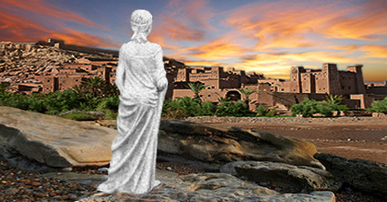
Are you always looking back, nostalgic for the past? Do you wish you could go back in time and relive the happy days—or correct mistakes to change the present? Are you “Lot’s wife?”
Do you remember the instructional parable of Lot and his family from the Bible? In the book of Genesis we read that Lot, his wife, and his daughters were saved from the immanent destruction of the evil, degenerate city in which they were living, Sodom. They were told to quickly flee without stopping and admonished not to “look behind”—to hold onto the past. But Lot’s wife, unable to let go, still yearned for her former life. She turned back to gaze longingly at the city and metaphorically became a “pillar of salt”—forever rooted in place, unable to move forward.
A constant harkening to the past, believing it held more good than we are experiencing today, lets in little Light to illumine our forward path. As we strive to loosen the past’s hold on our present and future progress, that doesn’t mean that we don’t cherish the happy memories—recalling the wonderful times we have shared with others, the milestones in our human experience, or our proudest accomplishments. However, romanticizing those “good old days” might be deceiving. It is easy to narrow our memory to what was good, thereby minimizing the challenges or negative, unhealthy attitudes we had during those times.
Another aspect to living in the past is the proclivity to castigate ourselves for former mistakes; yet we know we cannot change the past, it can only serve as a guidepost for the present. Being regretful for past transgressions is a positive, progressive step, it shows a recognition that the acts were violations of Truth, Law, and Love. But the commitment to not repeat past mistakes in the present is what is needed now to move us, and possibly others, forward to healing.
Would’ve, should’ve, could’ve—we have all had these feelings, sorrow for roads not taken, opportunities missed. But rather than spend our precious, present moments ruminating about a past that cannot be altered, we need to develop a more spiritual approach to our decision-making process for present and future growth. As we actively seek to align thought and action with our expression of each facet of God’s nature, the proper, most advantageous path to pursue becomes clearer, and we can then let go of the painful disappointments and failures we previously experienced.
The present may be fraught with challenges, the future maddingly unsure, but we can’t find healing or exciting new opportunities if we are facing backward, rooted in place by a preoccupation with a bygone personal history. In the autumn, the trees don’t mourn over lost leaves, they are busy creating a new batch—indeed, it is the internal new growth that causes the leaves to loose sustenance and viability and naturally fall away.
We are not our stories nor are we prisoners of our past if we claim our God-given dominion of the present—always affirming that today is rife with new possibilities and fullly acknowledging Life’s eternal progression.
Do you remember the instructional parable of Lot and his family from the Bible? In the book of Genesis we read that Lot, his wife, and his daughters were saved from the immanent destruction of the evil, degenerate city in which they were living, Sodom. They were told to quickly flee without stopping and admonished not to “look behind”—to hold onto the past. But Lot’s wife, unable to let go, still yearned for her former life. She turned back to gaze longingly at the city and metaphorically became a “pillar of salt”—forever rooted in place, unable to move forward.
A constant harkening to the past, believing it held more good than we are experiencing today, lets in little Light to illumine our forward path. As we strive to loosen the past’s hold on our present and future progress, that doesn’t mean that we don’t cherish the happy memories—recalling the wonderful times we have shared with others, the milestones in our human experience, or our proudest accomplishments. However, romanticizing those “good old days” might be deceiving. It is easy to narrow our memory to what was good, thereby minimizing the challenges or negative, unhealthy attitudes we had during those times.
Another aspect to living in the past is the proclivity to castigate ourselves for former mistakes; yet we know we cannot change the past, it can only serve as a guidepost for the present. Being regretful for past transgressions is a positive, progressive step, it shows a recognition that the acts were violations of Truth, Law, and Love. But the commitment to not repeat past mistakes in the present is what is needed now to move us, and possibly others, forward to healing.
Would’ve, should’ve, could’ve—we have all had these feelings, sorrow for roads not taken, opportunities missed. But rather than spend our precious, present moments ruminating about a past that cannot be altered, we need to develop a more spiritual approach to our decision-making process for present and future growth. As we actively seek to align thought and action with our expression of each facet of God’s nature, the proper, most advantageous path to pursue becomes clearer, and we can then let go of the painful disappointments and failures we previously experienced.
The present may be fraught with challenges, the future maddingly unsure, but we can’t find healing or exciting new opportunities if we are facing backward, rooted in place by a preoccupation with a bygone personal history. In the autumn, the trees don’t mourn over lost leaves, they are busy creating a new batch—indeed, it is the internal new growth that causes the leaves to loose sustenance and viability and naturally fall away.
We are not our stories nor are we prisoners of our past if we claim our God-given dominion of the present—always affirming that today is rife with new possibilities and fullly acknowledging Life’s eternal progression.







